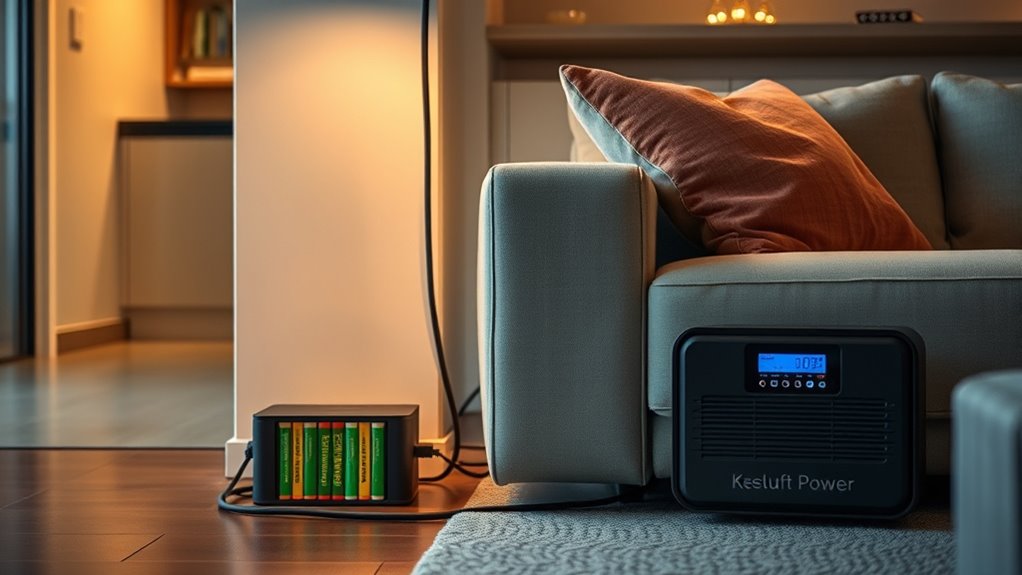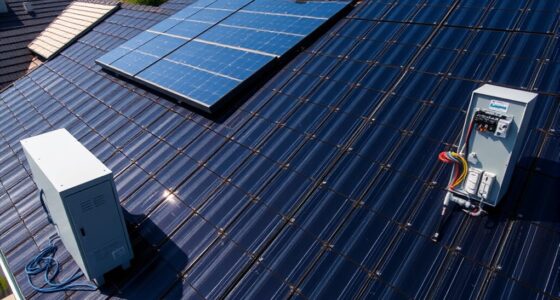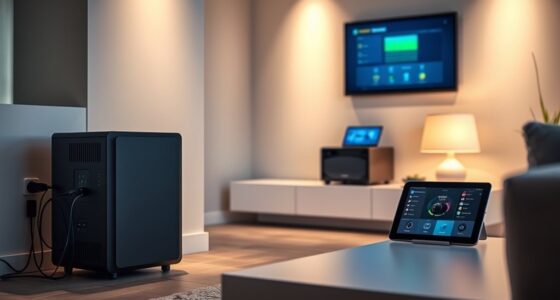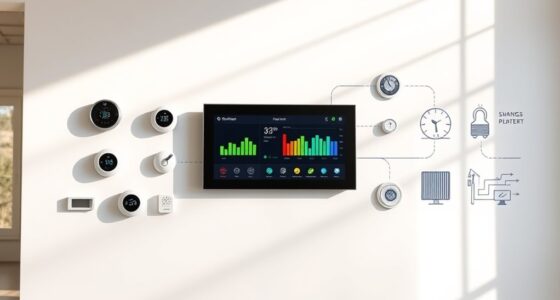Many believe all backup power options are alike or that bigger batteries always last longer, but that’s not true. Portable generators are often the best choice for apartments, and not all systems are expensive—there are budget-friendly options like power banks. Lithium batteries can be safe if handled properly, and backup power isn’t just for outages—it helps daily comfort too. If you’re curious about avoiding common mistakes and choosing the right setup, there’s more to uncover.
Key Takeaways
- Not all backup power options offer the same capacity, lifespan, or suitability for apartment use; choosing the right system is crucial.
- Lithium batteries require careful handling and safety precautions to prevent fire hazards in apartment environments.
- Portable generators are often more practical for apartments due to their ease of installation and mobility.
- Proper installation and adherence to local regulations are essential to ensure safety and avoid legal issues.
- Larger batteries do not always mean longer backup time; performance depends on battery quality, load, and management system.
All Backup Power Solutions Are the Same
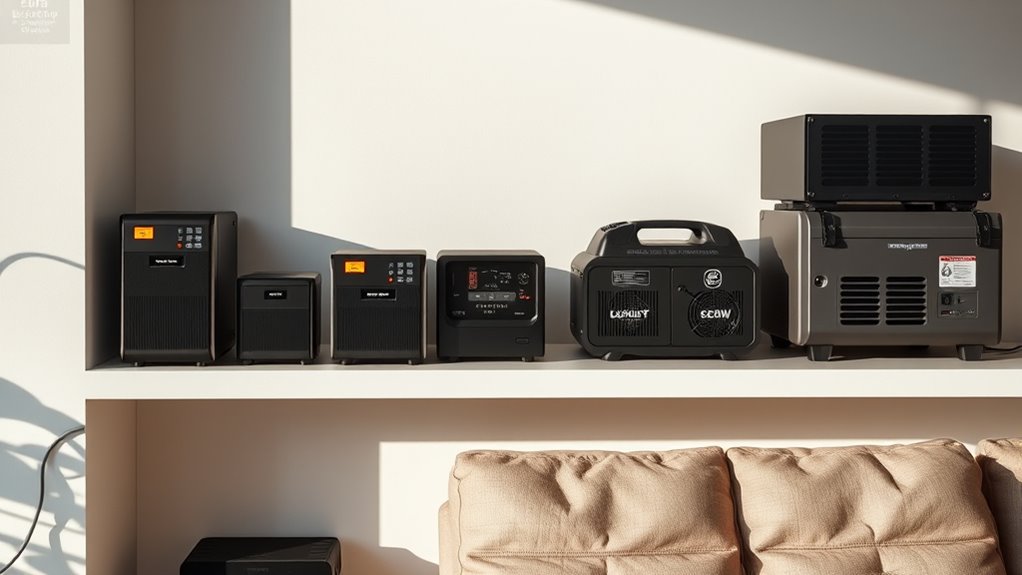
Not all backup power solutions are created equal; they vary considerably in performance, reliability, and suitability for your apartment. One key difference is battery lifespan, which determines how long your backup system will last over time. Cheaper options often have shorter lifespans, requiring frequent replacements, which can be costly. Meanwhile, effective power management is essential for ensuring your backup system operates efficiently when needed. Good systems intelligently control power flow, conserving energy and extending runtime during outages. Some solutions prioritize quick startup, while others focus on long-term durability. Understanding these differences helps you choose a backup power option that fits your needs and budget. Remember, investing in a system with a longer battery lifespan and smart power management can save you headaches and money in the long run. Additionally, considering the total-cost of ownership over time can help you make a more informed decision and avoid unexpected expenses.
Larger Batteries Always Mean Longer Run Time
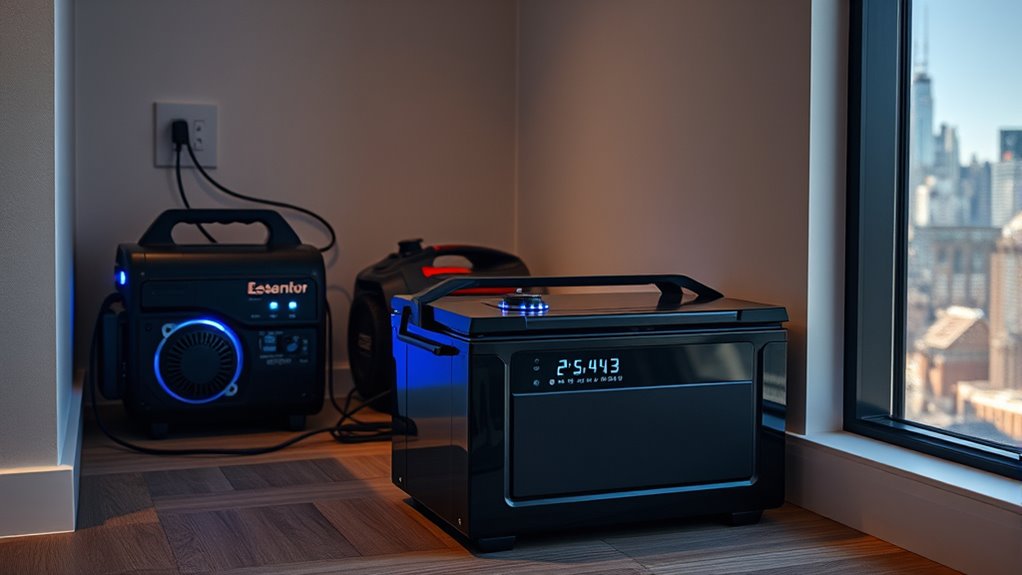
A bigger battery doesn’t always guarantee longer backup time. Your actual run time depends on your power load and the battery’s quality. Understanding these factors helps you choose the right backup solution for your apartment.
Battery Capacity Varies Significantly
While larger batteries often seem like the obvious solution for longer backup power, their capacity doesn’t guarantee extended run times. Battery longevity depends on factors beyond size, such as how capacity scales with usage. A bigger battery doesn’t always mean longer backup duration because:
- Efficiency Loss: Larger batteries can have decreased efficiency, reducing actual run time.
- Design Differences: Not all batteries are built for capacity scaling; some prioritize longevity over size.
- Usage Patterns: Your load impacts run time more than battery size alone—more capacity doesn’t offset high power consumption.
- Battery Chemistry variations can affect performance and lifespan, influencing how effectively a larger battery will work over time.
Understanding these points helps you choose the right backup system, focusing on capacity scaling and battery longevity rather than just size. This ensures you get consistent, reliable power during outages without overestimating what a bigger battery can deliver.
Run Time Depends on Load
Larger batteries don’t automatically guarantee longer backup times because your actual run time depends heavily on how much power your devices draw. The load capacity directly impacts how long your backup power lasts. If you connect high-demand appliances, the run time decreases, even with a bigger battery. Conversely, low-power devices extend the backup period. Here’s a quick look at how load affects run time:
| Load Capacity (W) | Estimated Run Time (hours) | Battery Size Needed |
|---|---|---|
| 50 | 4 | Small |
| 100 | 2 | Medium |
| 200 | 1 | Large |
| 300 | 0.5 | Extra Large |
| 400 | Less than 0.5 | Very Large |
Understanding load capacity helps you choose the right backup system for your needs. Additionally, considering contrast ratio can help ensure your devices perform optimally during power outages.
Battery Quality Influences Duration
Battery quality plays a significant role in how long your backup power lasts, regardless of battery size. A high-quality battery ensures better battery longevity and consistent power duration. Even a large battery won’t perform well if its components are subpar. To maximize run time, consider:
- Using batteries with proven durability and high cycle life.
- Choosing batteries from reputable manufacturers with quality control.
- Maintaining batteries properly, like avoiding deep discharges and keeping them charged.
- Selecting batteries with appropriate discharge rates to ensure optimal performance under load.
Portable Generators Are the Best Apartment Backup Option

Portable generators stand out as the most practical backup power solution for apartment dwellers because they’re easy to operate, maintain, and transport. Unlike larger backup systems, portable generators don’t require complex installation, making them ideal for renters. They provide sufficient power during outages, especially for essential devices, thanks to their adjustable wattage and fuel capacity. While portable generators don’t use batteries like other backup options, they do have a fuel tank that determines how long they can run. Properly choosing one with the right fuel capacity guarantees you have enough power when needed. Additionally, portable generators are versatile, allowing you to move them easily around your apartment or even outdoors if necessary. This flexibility makes them a reliable, convenient backup solution for apartment living. Implementing multi-factor authentication (MFA) can further enhance your safety when managing backup power systems or related equipment.
Backup Power Solutions Are Too Expensive for Renters
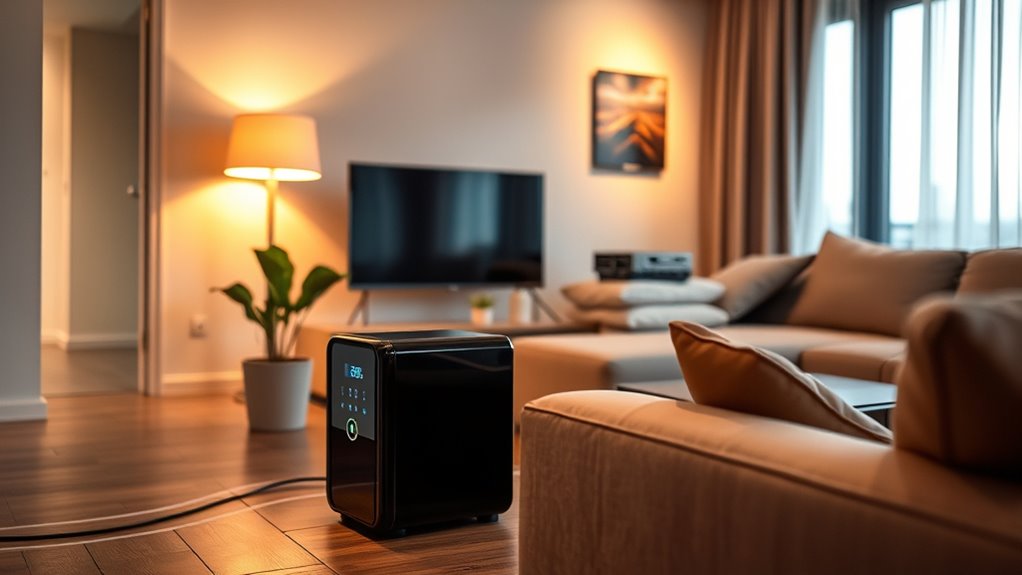
For many renters, investing in backup power solutions can seem prohibitively expensive, especially when considering the costs of generators, inverters, or whole-house systems. However, there are cost-effective options that won’t break the bank. First, portable power banks offer a budget-friendly solution for essential devices. Second, small inverter-based systems can power your Wi-Fi and lights without hefty upfront costs. Third, exploring DIY or modular battery packs can help you build a tailored backup system over time. These solutions are affordable, easy to set up, and don’t require permanent installation. By focusing on budget-friendly options, you can guarantee reliable backup power without overspending, making preparedness accessible for renters on any budget. Additionally, understanding alternative power sources can help you identify even more affordable options tailored to your needs.
You Can Use Any Power Source to Charge Your Backup System

You’re not limited to a single power source when charging your backup system; in fact, you can use almost any available source to keep your batteries topped off. This flexibility allows you to tap into various power sources, including alternative energy options, making backup power more accessible in apartments. Whether you’re using grid power, solar panels, or even wind turbines, each can be an effective way to recharge your system. Here’s a quick overview:
| Power Source | Suitability |
|---|---|
| Grid electricity | Reliable, common in most apartments |
| Solar panels | Eco-friendly, renewable |
| Wind turbines | Suitable if you have space and wind access |
| Portable generators | Backup during outages |
| USB power banks | Small, portable, convenient |
Choose the best options based on your environment and energy preferences. Battery management is key to ensuring your backup system remains reliable over time.
Inverter-Based Systems Are Only for Off-Grid Living
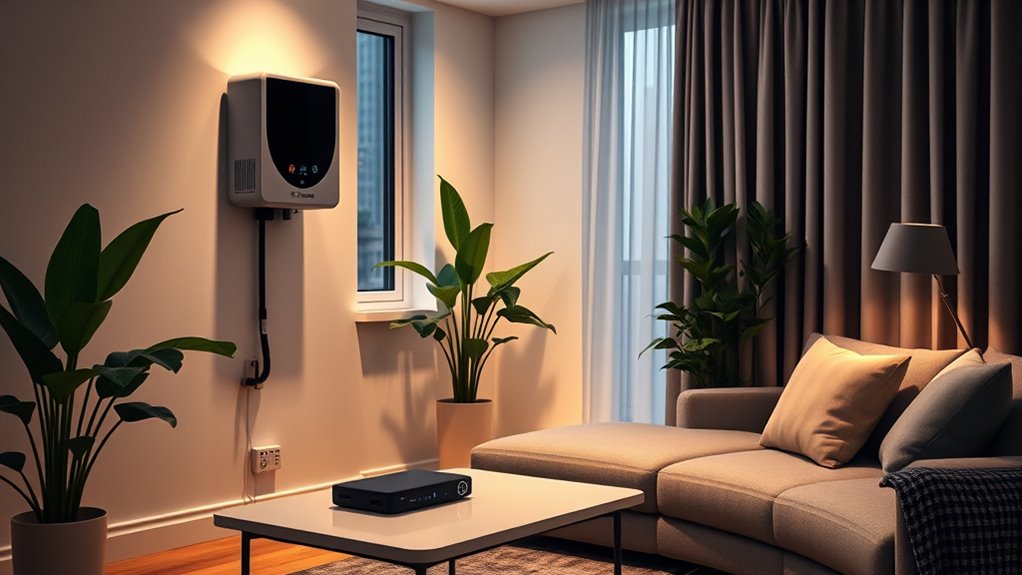
Many assume inverter-based systems are solely designed for off-grid living, but that’s not accurate. These systems are versatile and can be integrated into apartment setups for several reasons:
Inverter systems are versatile, perfect for apartments, and not just for off-grid living.
- They offer solar compatibility, allowing you to use renewable energy sources and reduce reliance on the grid.
- They support grid independence, enabling you to maintain power during outages without needing a full off-grid system.
- They provide clean, stable power suitable for sensitive electronics, making them ideal for apartment use.
Inverter-based systems aren’t just for remote locations—they’re practical solutions for city dwellers seeking backup power that’s efficient, flexible, and adaptable to various energy sources.
All Backup Power Devices Require Professional Installation
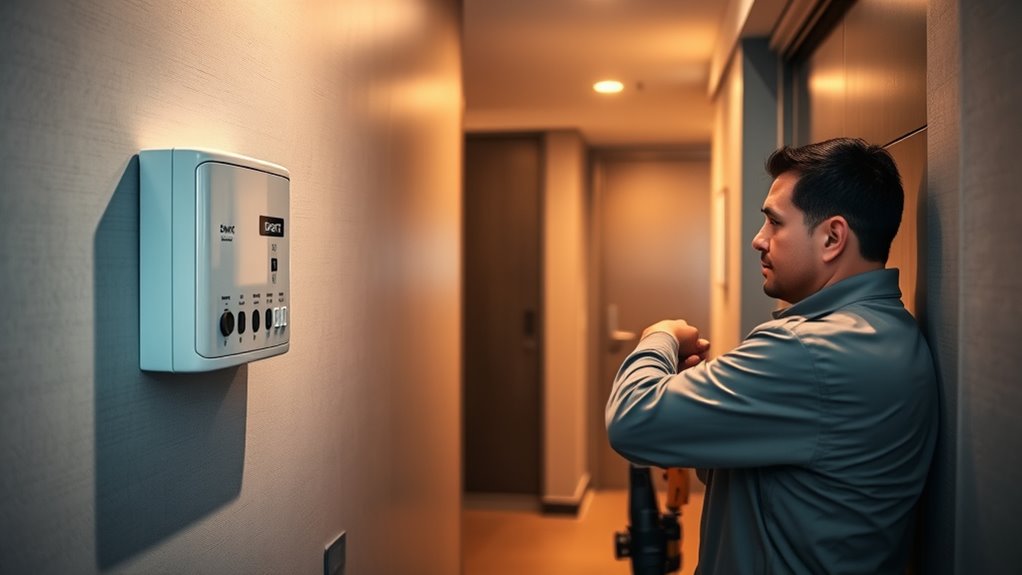
Installing backup power devices isn’t a simple task, and the complexity can vary depending on the system. You should consider hiring a professional to guarantee everything is set up safely and correctly. Trying a DIY approach can lead to mistakes that might compromise your home’s safety or the device’s performance. Proper installation often involves transfer switch installation and adherence to safety standards to ensure reliable operation.
Installation Complexity Varies
Since backup power systems involve complex wiring and integration with your home’s electrical setup, professional installation is crucial. The installation challenges can vary depending on your apartment’s layout and existing wiring. For example:
- Space considerations may limit the size or type of backup device you can install.
- Wiring complexity can affect the time and effort needed to connect the system safely.
- Compatibility issues might require additional components or adjustments to your electrical panel.
- Ensuring proper juice extraction from your backup power system can influence its efficiency and safety.
Your installer will assess these factors to ensure a seamless setup. Some systems are straightforward, while others demand more detailed work. Regardless, professional installation guarantees safety, functionality, and compliance with local codes, making sure your backup power works when you need it most.
Professional Setup Recommended
Because backup power systems involve complex wiring and integration with your home’s electrical system, professional installation is essential. A professional setup ensures the system is correctly connected and functions reliably during outages. Trained technicians can handle the wiring safely, avoiding potential hazards or electrical damage. They also optimize the system for your specific apartment layout, ensuring maximum efficiency. Proper installation guarantees that your backup power device switches smoothly when needed, providing peace of mind. Attempting a DIY setup can lead to improper connections, system failures, or safety risks. Investing in professional installation not only safeguards your property but also enhances system optimization, ensuring your backup power works seamlessly when it matters most. Proper installation safeguards your property and enhances system performance, ensuring your backup power functions reliably in emergencies. Trust experts for a safe, reliable, and efficient backup power solution.
DIY Risks Involved
Attempting to install backup power devices yourself can lead to serious safety hazards and system failures. DIY dangers include electrical shocks, fire risks, and equipment damage if not handled correctly. To avoid these issues, keep these points in mind:
- Lack of proper training can result in improper wiring, risking electrocution or fire.
- Incorrect installation may void warranties or cause system malfunctions during outages.
- Inadequate risk awareness can lead you to overlook safety protocols, increasing accident chances.
Because of these risks, professional installation is essential. Skilled technicians understand the complexities of backup power systems and adhere to safety standards. Remember, the potential consequences of DIY mistakes outweigh any perceived convenience or savings. Prioritize safety by trusting the experts with your backup power setup.
Backup Power Systems Can Run All Home Appliances Simultaneously

Modern backup power systems are capable of running all your home appliances simultaneously, guaranteeing you don’t have to choose between essential devices during an outage. The key is sufficient power capacity, which determines how many appliances you can operate at once. High-capacity systems can support refrigerators, lights, Wi-Fi, and even small HVAC units without issue. However, keep in mind that battery lifespan influences long-term reliability; a system with a longer-lasting battery will serve you better over time, reducing the need for frequent replacements. While some backup options may seem powerful initially, lower-quality batteries can degrade quickly, limiting your ability to run multiple appliances. Choosing a system with appropriate power capacity and durable batteries ensures you’re prepared for extended outages without sacrificing comfort.
Lithium Batteries Are Unsafe for Apartment Use
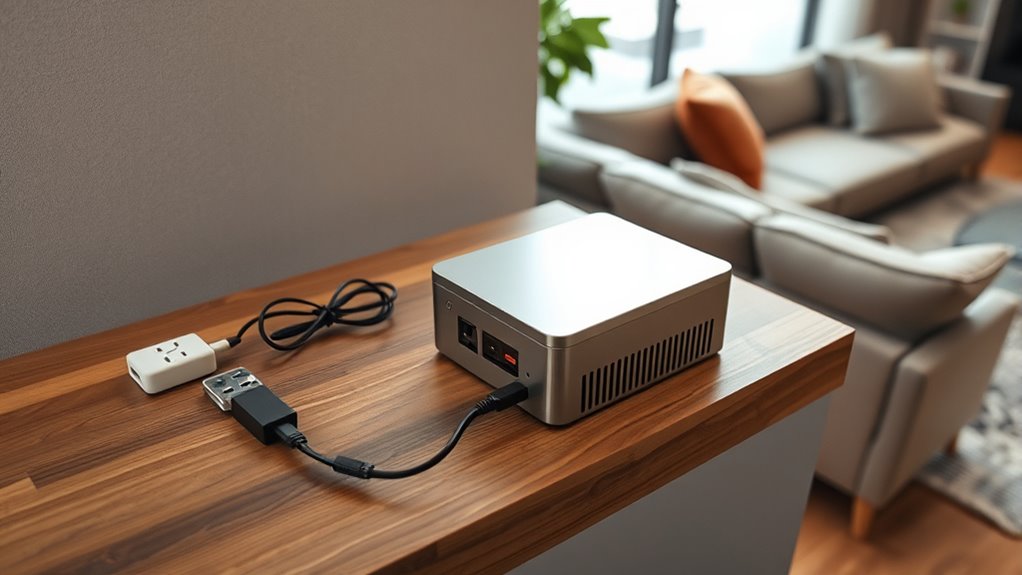
Lithium batteries can pose safety risks if not handled properly, making them a concern for apartment use. While accidents happen, following proper safety guidelines can reduce these dangers considerably. It’s important to understand these risks before choosing lithium batteries for your backup power needs.
Safety Concerns Persist
While lithium batteries offer convenient power storage, they also pose significant safety risks in apartment settings. Fire safety is a major concern, as lithium batteries can overheat and ignite unexpectedly. Electrical hazards further increase the danger, especially if batteries are damaged or improperly handled. Here are some key risks to consider:
- Fire risk: Thermal runaway can cause batteries to catch fire, risking property damage and personal injury.
- Electrical hazards: Short circuits or faulty connections can lead to shocks or fires.
- Vulnerability during charging: Overcharging or using incompatible chargers can cause overheating or explosions.
Given these dangers, it’s essential to prioritize safety and understand the potential hazards associated with lithium batteries in confined apartment spaces.
Proper Handling Mitigates Risks
Handling lithium batteries properly is essential to reducing the safety risks they pose in apartment settings. Proper handling includes storing batteries in a cool, dry place away from flammable materials, avoiding overcharging, and inspecting for damage regularly. By following these safety practices, you actively engage in risk mitigation, preventing potential fires or chemical leaks. Always use chargers and devices recommended by the manufacturer, and never attempt to modify or tamper with the batteries. It’s also vital to keep a fire extinguisher nearby and know how to use it in case of an emergency. Proper handling not only safeguards your living space but also prolongs the battery’s lifespan, ensuring safe and reliable backup power when you need it most.
Backup Power Solutions Are Only Useful During Power Outages
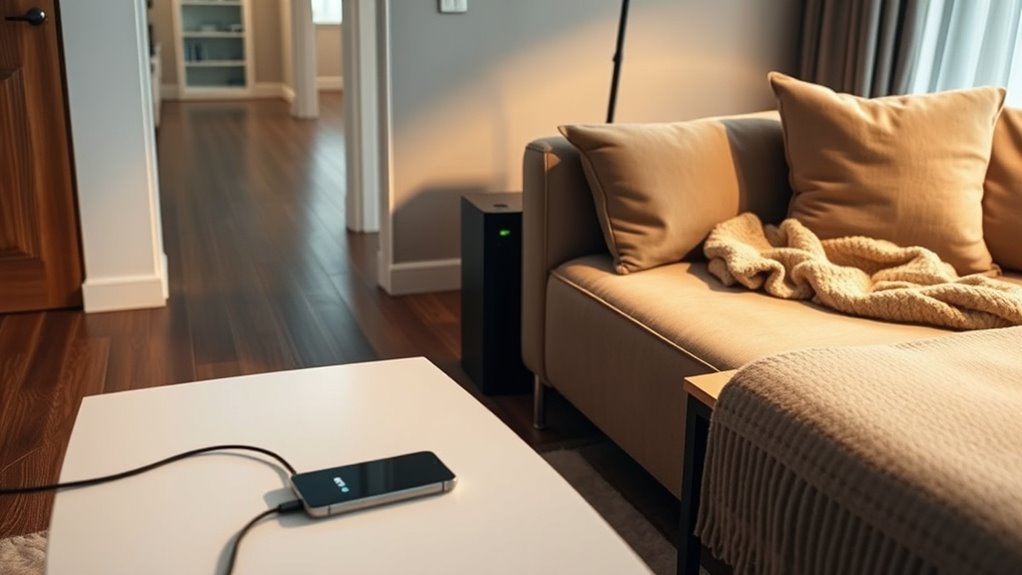
Many assume that backup power solutions are only valuable during outages, but their benefits extend beyond just emergency situations. You can use portable generators or battery capacity to maintain daily convenience and productivity. For example:
- Keep essential appliances running during short power interruptions, preventing food spoilage or loss of work.
- Use backup power to charge devices and stay connected, especially if you work remotely or rely on the internet.
- Enhance comfort by powering fans or heaters, making your apartment livable during minor outages or fluctuations.
These solutions aren’t just for emergencies—they’re practical tools for everyday peace of mind. Investing in a portable generator or increasing your battery capacity guarantees you’re prepared for more than just blackouts.
Solar-Powered Backup Systems Are Not Effective in Cloudy Climates

Solar-powered backup systems often face skepticism in cloudy climates because limited sunlight reduces their ability to generate electricity effectively. While it’s true that solar efficiency drops when sunlight is scarce, modern systems can still produce power, especially with improved technology. The climate impact on solar efficiency varies; some regions with frequent overcast days may see reduced output. However, advancements like higher-efficiency panels and energy storage mitigate these issues. In cloudy climates, combining solar with other backup options often proves more reliable. Understanding the limitations and benefits helps you make informed decisions about solar backup systems for apartments.
| Climate Impact | Solar Efficiency |
|---|---|
| Reduced sunlight | Lower output in overcast days |
| Seasonal variations | Better performance in summer |
| Cloud cover | Decreases energy production |
| Technological advances | Improve efficiency in cloudy weather |
You Need a Permit or Special Approval to Install Backup Power in an Apartment
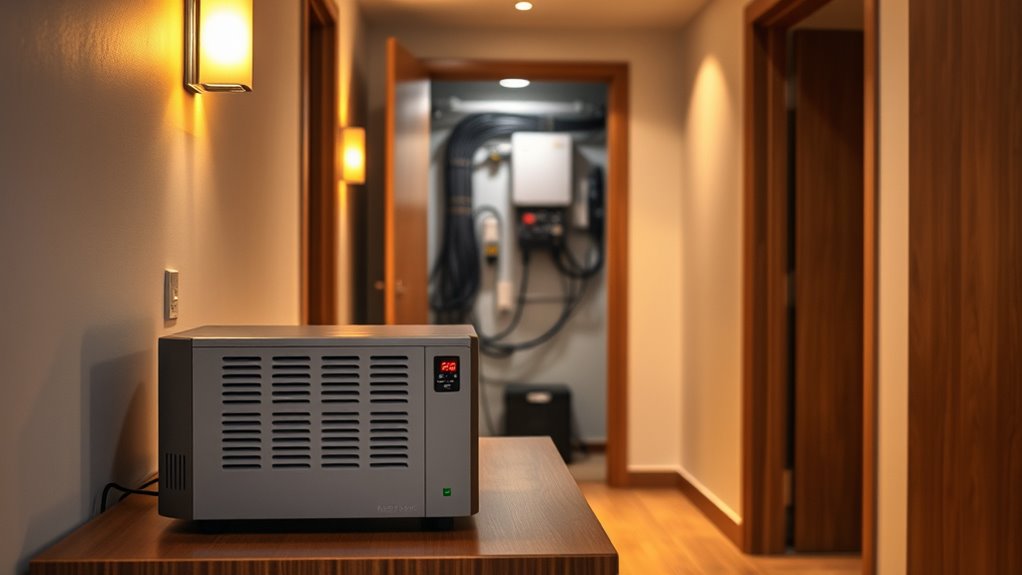
Installing backup power systems in an apartment typically requires obtaining a permit or special approval from your building management or local authorities. Understanding the permit requirements and approval process is essential to avoid issues later. Here’s what you need to know:
- Check local regulations—some areas have strict rules about installing backup systems in apartments.
- Submit an application—this may include detailed plans for your backup power setup.
- Await approval—your building management or city officials will review your request and may request modifications.
Skipping this step can lead to fines, removal of the system, or safety concerns. Always start by researching permit requirements and following the official approval process to guarantee a smooth installation.
Frequently Asked Questions
Can Portable Backup Power Solutions Handle Multiple Devices Simultaneously?
Yes, portable backup power solutions can handle multiple devices simultaneously if you choose one with sufficient power capacity. Make certain to check the device compatibility and total wattage your backup system can support. By selecting a unit with higher capacity, you guarantee it can power your essential devices at once, avoiding overloads. Always read the specifications to match your device needs, giving you reliable backup power during outages.
Are There Noise Restrictions for Backup Generators in Apartments?
You’re right to ask—noise regulations do matter. Apartment backup generators must comply with local noise restrictions, so they shouldn’t be too loud or disturb neighbors. Most models feature mufflers and noise control options to keep generator noise down. To stay on the safe side, check your building’s rules or local laws before installing a generator. It’s better to be safe than sorry, especially when it comes to noise levels.
What Are the Safety Concerns With Lithium Battery Backup Systems?
You should be aware that lithium battery backup systems pose fire hazards if not properly managed. Poor battery management can lead to overheating, swelling, or even fires. Always make certain your system has built-in safety features like thermal cut-offs and proper ventilation. Regular inspections and following manufacturer guidelines are essential. By staying vigilant about battery health and management, you reduce risks and keep your apartment safe during power outages.
How Often Should I Maintain or Replace My Backup Power System?
You should check your backup power system’s battery lifespan regularly, ideally every 6 to 12 months, to guarantee it’s functioning properly. Follow the manufacturer’s maintenance schedule, which may include cleaning terminals and testing capacity. Replace the system when its battery no longer holds a sufficient charge or as recommended, typically every 3 to 5 years, to keep your backup power reliable and your home safe during outages.
Can Backup Power Systems Be Integrated With Smart Home Devices?
Yes, backup power systems can be integrated with smart home devices. You can connect them for seamless automation compatibility, allowing your backup system to turn on automatically during outages. Smart home integration lets you monitor power status remotely and control backup features via apps or voice commands. Just guarantee your backup power system supports compatible smart home platforms, making your apartment more efficient and resilient during power disruptions.
Conclusion
Don’t assume all backup power solutions are the same, or that size guarantees duration. Don’t believe portable generators are your only choice, or that backup systems are too costly. Avoid thinking any power source will do, or lithium batteries are unsafe. Don’t overlook the benefits beyond outages, or doubt solar’s effectiveness in cloudy skies. Remember, installing backup power doesn’t always need permits, and understanding these truths helps you make smarter, safer, and more reliable decisions for your apartment backup power needs.
